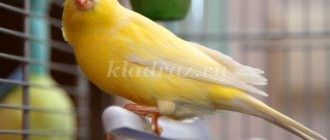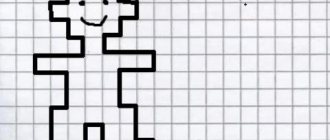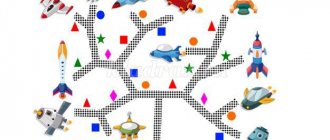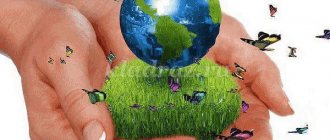Abstract of GCD on ecology in kindergarten using ICT. Senior preschool age
Abstract of the GCD on ecology for children of the preparatory school group “We take care of nature, because it protects our health!”
Program objectives: Educational:
expand and systematize children’s knowledge about nature, develop interest in the problem of nature conservation, introduce children to the norms and rules of behavior in nature.
Developmental:
develop in children the desire to make a feasible contribution to environmental protection, develop their horizons, thinking, and connected speech.
Educational:
to cultivate a joyful, caring attitude towards nature.
Preliminary work: reading fiction, asking riddles, observations, conversations. Materials and equipment: pictures with signs “Rules of Conduct in Nature”, balloons for each child, rubber gloves and attributes for the game “Sort out the garbage”
Procedure
Educator: Hello guys, guess the riddle: No beginning, no end, No back of the head, no face . Everyone, young and old, knows that she is a huge ball. What ball is this riddle talking about? It is so huge that all the people can fit on it! Children: Earth. Educator: Tell us what color our planet Earth is when viewed from space? Children: Blue and green. Slide 1. Educator: What do these colors mean? Children: Green color depicts land with all plants. And the blue color on the planet is all reservoirs, rivers, seas and oceans. Educator: Tell me, why do we need water? Children: Drink, swim, animals need water. Educator: What can you tell us about water? What is it like? Children: Fresh, drinking, purified, mineral, muddy, dirty. Educator: Where does water live? Children: In the ocean, sea, river, lake, water pipe, fountain, cooler, etc. Educator : Guys, do you know that fresh water reserves in the world are decreasing. But people, in order to be healthy, should drink only good, purified water. Do you know why this happens? Slide 2 Educator: Waste from enterprises is dumped into rivers, garbage is dumped into the seas. If we drink water that is contaminated, what do you think might happen? Children: We'll get sick! Educator: Correct. Guys, listen to another riddle: “So small that it can fit through any crack.” Children: This is air. Educator: What is he like, guys? Children's answers. Educator: Why do you think air is needed and who needs it? Children: To live, to breathe, it is impossible to live without it, all living organisms and people need it. Educator: Let's conduct an experiment with you. Close your nose with your fingers, and at the same time close your mouth with the palm of your other hand. What happened? Children: I can’t breathe, there’s not enough air. Educator: What do we breathe? Children: Oxygen. Educator: What are we exhaling? Children: Carbon dioxide. Educator: Which organ helps us breathe? That's right, lungs. Let's conduct an experiment. (Children inflate balloons: the teacher explains that the balloon is similar to our lungs, an inflated balloon is the lungs as we inhale, deflated as we exhale).
Educator: This is how our lungs work. Educator: What do we breathe? Children: Oxygen. Educator: What are we exhaling? Children: Carbon dioxide. Educator: What do you think will happen if the air disappears? Children's answers. Educator : Guys, why do you think many people are sick now? Children: The air on earth is very polluted. Slide 2. Educator: And this happens because plants and factories emit a lot of toxic substances into the air, cars pollute the air with exhaust gases. Slide 3 Educator : And people also cut down huge areas of forests, but you and I know that forests are the lungs of the Earth. Slide 4 Educator: But even in those forests that have not been cut down, people behave incorrectly! They are destroying nature! They catch and take home healthy birds, animals, and their young. In the forest they do not try to walk along the path, but trample down the grass and soil. This kills insects and plants. They leave behind garbage, cut down branches of trees and bushes, light fires, and many plants and insects die and suffocate from the fire! Educator: But you can’t throw garbage, why guys? Children's answers:
Animals can get hurt.
Educator: Is it possible to burn garbage? Children's answers
.
Educator: Plastic, polyethylene and metal objects cannot be burned! Because they do not burn, do not disappear completely, and do not decompose for a long time. Is it possible to bury it in the ground? Children's answers. Educator: You can only bury food waste, skins, peelings, and cores; they are even useful for the natural environment, as they transfer nutrients to the soil. What to do with the rest of the garbage? You cannot leave garbage behind; if you throw garbage in the forest after a picnic, it can lie in that place for many years. Can you imagine: paper can last for 3 years until it completely disappears; a tin can will decompose for 90 years, a plastic bag for 200 years, and a plastic bottle for 500 years. That is why garbage needs to be collected and thrown into special containers or special collection points. Then it will be sent for recycling, that is, reuse. Let's experiment. Educator: We will collect all the scrap metal in one box. What is called scrap metal? Children: All metal things. Everything that is made of metal. Educator : And in the second box we will collect all the waste paper. What do I call waste paper? Children: These are all paper waste: cardboard, old newspapers. Educator : We will collect all the glass containers in the third box. What is glass containers called? Children: Glass jars, bottles. This is food packaging, only made of glass. Educator: We will collect all the plastic in the fourth box, and all the food waste in the fifth. The game “Sorting out the garbage” is being played.
Children put on gloves and put in separate boxes: paper, cardboard - waste paper, plastic bottles - plastic, jars, tin - scrap metal, apples, potatoes - food waste, bottles, glass containers.
The teacher asks the children: What do you understand, guys? Children: Garbage must be sorted, it cannot be burned, and not all garbage can be buried in the ground.
Slide 5 Educator: People exterminate animals, hunt them, many species of animals have disappeared, many are listed in the Red Book. What animals are considered endangered in our region? Children's answers. Slide 6
The water is becoming cloudy every day, And the air - how much dirt there is in it!
Once clean, blue, Now it is dirty and sick, All living things can perish, the Earth - what did they do to you? Educator: To be healthy, you and I need to breathe clean air, drink clean water and eat organic foods. But because of the actions of people, our planet is becoming sick, and if it dies, then all living things will die with it. But we can still cure her. And we all must strive to prevent our blue planet from turning into a dead, cold ball, flying alone among the sparkling stars. How can you and I help our planet, how can we take care of its nature? Educator: I gave you homework to draw environmental signs, let's see how you did it. Children explain environmental signs.
Educator: Some guys have learned poems, let's listen to them. Children read poetry.
Presentation on the topic: We protect nature, because it protects our health!
We recommend watching:
Summary of joint activities in the preparatory group. Earth Day Synopsis of a lesson on ecology in a preparatory school group Synopsis of an educational lesson in a preparatory school group “Where do milk rivers flow from” Synopsis of the OOD “Red Book of the Moscow Region” with children of the preparatory group of a kindergarten
Similar articles:
Summary of a lesson on ecology in the preparatory group. Plants on the territory of the kindergarten
Summary of a lesson on ecology in the preparatory group. Garden plants
Summary of a lesson on ecology in the preparatory group. Vegetable garden plants
Summary of a comprehensive lesson on ecology in the preparatory group. Topic: “Simple and valuable stones in nature”



